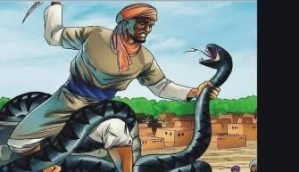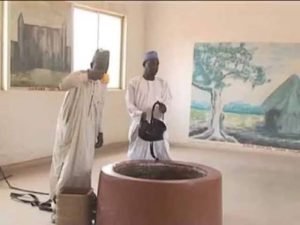Bayajidda is a legendary figure in the history of Hausa people, who are one of the largest ethnic groups in West Africa. According to the legend, Bayajidda was a prince from Baghdad who traveled across Africa and settled in Daura, a town in present-day northern Nigeria. There, he married the queen of Daura, Daurama, and became the ancestor of the seven original Hausa states: Daura, Kano, Katsina, Zaria, Gobir, Rano and Biram. These states, along with seven others that were founded by Bayajidda’s other sons and grandsons, are collectively known as the Hausa Bakwai (the seven true Hausas) and the Banza Bakwai (the seven illegitimate Hausas).
The legend of Bayajidda has been transmitted through oral tradition for centuries, and there is no historical evidence for his existence or his exact origin. However, the legend reflects some aspects of the cultural and political history of the Hausa people, such as their interaction with Islam, their resistance to colonialism, and their diversity and unity.
The legend has different versions and variations, but the most common elements are that:
Bayajidda was a prince from Baghdad who was exiled from his homeland after a queen named Zidam or Zigawa conquered the city. He left with a large army and traveled across Africa in search of a new place to settle.
He arrived in Borno, where he married a princess named Magaram or Magira, who was the daughter of the king of Kanem-Bornu Empire. He had a son with her named Biram, who later became the ruler of Gabas-ta-Biram (east of Biram).
He left Borno after having a conflict with the king, who was either jealous of his popularity or suspicious of his plot to overthrow him. He went to Gaya, where he had a knife made by local blacksmiths.
He then went to Daura, where he encountered a giant snake that lived in a well called Kusugu. The snake prevented the people of Daura from accessing water except on Fridays. Bayajidda killed the snake with his knife and freed the water for the people.
As a reward for his bravery, he was offered half of Daura by the queen Daurama, who was also known as the last Kabara (matriarchal ruler) of Daura.
He refused and asked for her hand in marriage instead. She agreed and they had a son named Bawo.
Bawo succeeded his father as the king of Daura and had six sons who became the rulers of six other Hausa states: Kano, Katsina, Zaria, Gobir, Rano and Hadeja. These states formed the Hausa Bakwai.
Bayajidda also had another son named Karbagari with a concubine who was a Gwari woman. Karbagari had seven sons who became the rulers of seven other states: Kebbi, Zamfara, Gwari, Jukun, Ilorin, Nupe and Yauri. These states formed the Banza Bakwai.
The legend of Bayajidda has been a source of inspiration and pride for many Hausa writers and historians who have written about it in various forms and languages. Some of the best known writers who have used or referenced the legend are:
Abubakar Tafawa Balewa (1912-1966), who was a prime minister of Nigeria and wrote Shaihu Umar , a novel about a Hausa scholar who lived during the time of Bayajidda.
Nana Asma’u (1793-1864), who was a poetess, educator and daughter of Usman dan Fodio , the founder of Sokoto Caliphate . She wrote poems in Arabic , Hausa , and Fula languages about Islamic history and leaders , including Bayajidda.
Muhammadu Bello Kagara (1906-1978), who was one of the first novelists in Hausa language and wrote Gandoki , a novel about a hero who fought against British colonialism , inspired by Bayajidda.
Abubakar Imam (1911-1981), who was another pioneer of Hausa literature and wrote Ruwan Bagaja (The Water of Cure) , which won the first Hausa writing competition in 1933 and was based on a folk tale related to Bayajidda.
Sa’adu Zungur (1915-1958), who was a poet and politician and wrote poems in Hausa language that criticized colonialism and praised the Hausa culture and history, including Bayajidda.
The legend of Bayajidda is still alive and celebrated in Hausa culture today. Every year, in Daura, there is a festival called Kusugu Daura , where the slaying of the snake by Bayajidda is re-enacted and the well is visited by pilgrims. The legend is also depicted in art, music, drama, and comics.
The story of Bayajidda is a fascinating example of how oral tradition can shape the identity and imagination of a people. It is also a testimony to the rich and diverse heritage of the Hausa people, who have contributed to the literature and history of Africa and the world.







